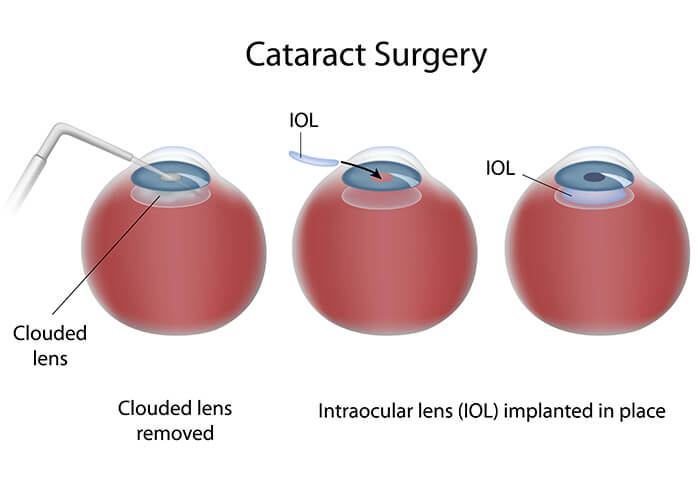When should a person consider surgery and what is a visually significant cataract? It is time to consider surgery when your best vision with glasses is reduced to a level where the activities of your daily life are significantly affected. For example, you can no longer drive legally due to glare or read comfortably without a very bright light. Early on in the development of a cataract adjusting your glasses prescription may help to improve your vision. Eventually, new glasses will no longer help and surgery would be your only option to improve your vision.

Cataract surgery is one of the most frequently performed of all surgeries and boasts one of the highest success rates. It is performed on an outpatient basis in an operating room under sterile conditions. Local anesthesia is used except in rare instances, so you are awake during the surgery which is typically pain free. Contrary to popular belief, cataract surgery is NOT done with a laser. Our surgery is done with the latest microsurgical techniques such as ultrasound (phacoemulsification) and other techniques which break up the cataract into small pieces so the removal can be performed through a small opening into your eye. This helps speed healing with a return to good vision and your ability to perform your normal daily activities.
After the surgery you can not touch or rub your eye for at least a month and you should not bend over at the waist for a week. You will need to use eye drops to prevent infection and scarring for a few weeks. Depending on your glasses prescription before surgery and the vision in your other eye, you may be able to drive safely in a few days after surgery or you may have to wait up to a few weeks. The recovery process is typically pain free, however occasionally you may feel like your eye is dry or that there is an eyelash in it. Most people need to continue to wear glasses after surgery because the implants do not correct for astigmatism nor is there a bifocal built into the new lens.
There are risks with cataract surgery as with any operation. There is a small but real risk of infection, retinal detachment or scarring which could permanently reduce your vision. Other risks include the dislocation of the lens implant, the development of glaucoma (pressure in the eye), bleeding and clouding of the surface layer of the eye (cornea). This list is incomplete and at the time of your surgery your surgeon will discuss the risks which would apply to your particular situation. Drs. Garfinkle and Scott have each performed thousands of cataract surgeries and have more than 15 years experience with the most modern techniques.
We are pleased that we are now affiliated with a state of the art ambulatory surgery center (ASC) right here in Gilford/Laconia. If you are in need of eye surgery we are pleased to provide these services on an out-patient basis at Hillside Surgery Center.

 (603) 524-2020
(603) 524-2020 Order Contact Lenses
Order Contact Lenses Pay Your Bill Online
Pay Your Bill Online



